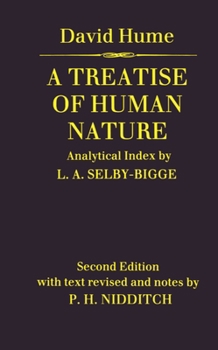A Treatise of Human Nature
(Part of the A Treatise of Human Nature Series and Great Books in Philosophy Series)
Select Format
Select Condition 
Book Overview
David Hume's Treatise of Human Nature, composed before the author was twenty-eight years old, was published in 1739 and 1740. This description may be from another edition of this product.
Format:Paperback
Language:English
ISBN:0198245882
ISBN13:9780198245889
Release Date:November 1978
Publisher:OUP UK
Length:768 Pages
Weight:1.33 lbs.
Dimensions:1.7" x 5.5" x 8.5"
Customer Reviews
2 ratings
Great Principles on Understanding, Emotions, & Morals
Published by Thriftbooks.com User , 19 years ago
According to David Hume, the mind and body are integral units, with one unable to exist or operate without the other. There are no "innate" ideas, nor logically a priori knowledge, only sense impressions that arise out of direct experience of the five senses and concomitant sense ideas that arise in the imagination. The imagination (i.e., mind) then makes associations. From these various sense impressions and ideas, the imagination commingles the ideas with inferences from resemblance, contiguity, and causality. Examples: The imagination relates one sense impression and its concomitant sense idea with another when they share similar characteristics or resemble one another, such as in shape, height, weight, distance, proportion, color, etc. The imagination associates one sense impression and its concomitant sense idea with another when they are in close contiguity, such as proximity in time, place, situation, connection, succession, etc. Lastly, the imagination associates one sense impression and its concomitant sense idea with another when there appears to be some cause and effect, for example when one turns on a wall switch, and a light appears, or one turns a key in an ignition, and a car starts, or other causal inferences. Only from the sense ideas and impressions, commingled with the imagination's inferences of resemblance, contiguity, and causality, can any opinion or belief or knowledge be known. The difference between an opinion, belief, or knowledge is only one of degree, namely, how strong, convincingly, and lively (Hume uses the word "vivacity") the senses, their ideas, and the inferences work themselves out in the imagination. Generally, knowledge is reserved only for the strongest of degrees of inference, such as those verifiable and not refutable by inferential (cf., deductive) logic or experimentation; all else is either opinion or belief. But no knowledge, no matter how often repeated and examined inductively, is absolute; all knowledge, like opinion and belief, is contingent. For "absolute" knowledge once held the earth to be flat, to be the center of the universe, and non-rotating. Even Einstein's Theory of Relativity had to be revised by a Special Theory of Relativity. We still don't understand how the universe can be "full" and still "expanding," yet both are true (so far!). Only knowledge, belief, and opinion derived from the senses, their ideas, and imaginative inferences have merit; all other "imaginations," such as the deductive existence of a "God" or Supreme Being, absolute morals, or correct emotions, are merely speculative imaginations, and ultimately all such speculation leads to nothing more than myth or superstition, false dogmas, and irrational beliefs. The passions, better known as either sensations or emotions, are derived from sense experience as well and are derived from the other sense impressions and sense ideas. Sensations are those experiences that arise within the imagination itself, based on something the
Should be the standard student text.
Published by Thriftbooks.com User , 24 years ago
The Oxford Philosophical Texts series bills itself as "complete editions for students," and the texts do live up to their promise. Hume's "A Treatise of Human Nature" is an excellent text and resource for the student. David Fate Norton's Introduction itself is worth the price of the book. In addition to the Introduction, this edition includes Hume's "An Abstract of . . . A Treatise of Human Nature," Editor's Annotations to both the "Treatise" and the "Abstract," a glossary, and references cited by Hume and by the Editor. This edition should be the standard student edition of the "Treatise."







